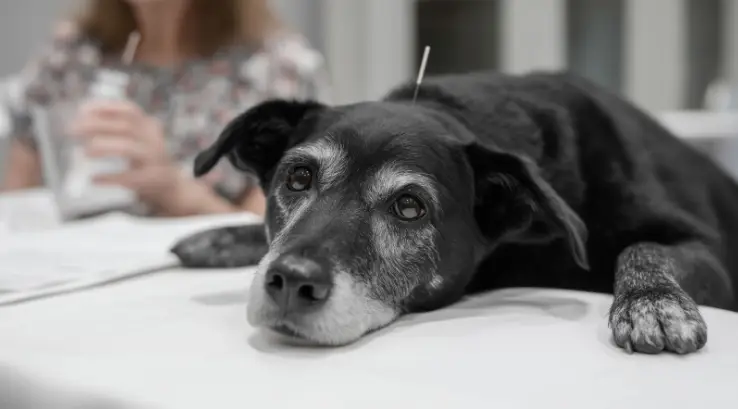Pet acupuncture is catching on as a gentle, supportive way to help animals feel better, whether they’re struggling with chronic pain, anxiety, or tough recoveries. This method uses thin needles at certain places on your pet’s body to give a boost to healing, ease discomfort, and help them unwind. It might seem a bit out of the ordinary if you’re new to it, but when handled by the right professional, it offers dogs, cats, and even rabbits or horses a safe path to improved comfort and a better life.

Understanding Pet Acupuncture: What’s It All About?
Acupuncture for pets has its roots in traditional Chinese medicine, just like the technique used for people. The basic idea is that the body has pathways (called meridians) where energy flows. Stimulating specific sites can help restore balance and push the body to heal itself. Research in the world of veterinary medicine has shown real benefits for a range of issues, especially when acupuncture is blended with conventional vet care.
Most pets do just fine with acupuncture, and many actually become calm and relaxed during the sessions (sometimes snoozing right through). Treatments are always customized to your pet, so what works for an older dog with stiff joints may be different from a plan for a young cat struggling with anxiety.
Common Conditions Helped by Acupuncture
This ancient approach comes in handy for many pet health issues. Here are some top reasons pet lovers try acupuncture:
- Arthritis and mobility issues: Acupuncture helps soothe pain and decrease inflammation, letting pets move more comfortably.
- Post-surgery recovery: It supports quicker healing and helps reduce swelling or pain after an operation.
- Chronic pain: Issues such as hip dysplasia, back pain, or old injuries often respond well to regular acupuncture sessions.
- Digestive problems: Things like diarrhea, constipation, and queasiness can get better with carefully chosen needle placements.
- Neurological disorders: Pets facing disc disease or nerve problems sometimes find this therapy brings real relief and calm.
- Stress, anxiety, and behavioral issues: Many animals become more settled and even-tempered after several treatments.
Acupuncture isn’t a replacement for testing, medications, or other diagnostics when those are needed, but it’s a great support that fits into both short-term and long-term care plans.
What Happens During a Pet Acupuncture Session?
Many first-time pet parents are amazed at how easily their pets handle acupuncture. Here’s the usual process at a certified vet clinic:
- Assessment: The veterinary acupuncturist starts by learning your pet’s whole story—asking about symptoms, any recent changes in behavior, and even how they’ve been feeling overall.
- Physical exam: A hands-on examination follows, with careful checks for soreness, muscle knots, or anything out of the ordinary.
- Treatment plan: Each session is tailored to your pet, with acupuncture points chosen to match their unique symptoms and needs.
- Needling: They use very thin, single-use needles placed in designated spots. Most pets don’t react much, or they get so relaxed they drift off.
- Session length: The needles stay in for 10–30 minutes, depending on your pet’s needs and tolerance. Some clinics add calm music, soft mats, or treats to make the experience extra soothing.
After a visit, your pet might be extra sleepy or, occasionally, more energized than usual. Both reactions are normal and things usually even out by the next day.
Different Techniques Used in Veterinary Acupuncture
While regular acupuncture involves tiny needles, modern vet acupuncturists have several ways to help each animal get the most from treatment. Here are some of the main approaches:
- Dry Needle Acupuncture: The most basic version, using only needles put into the chosen spots. Suitable for almost any animal and many problems.
- Electroacupuncture: Soft, low electrical pulses are sent between a few needles. This can really help with chronic pain, paralysis, or nerve troubles and isn’t painful.
- Aquapuncture: Instead of a simple needle, a vet injects a tiny bit of sterile fluid (like vitamin B12 or saline) right into the acupuncture point. Great for animals that fidget a lot or when long-lasting effects are wanted.
- Laser Acupuncture: A gentle cold laser takes the needle’s place for pets who are super sensitive. The light stimulates acupuncture points painlessly, useful for nervous animals.
- Moxibustion: This involves warming a specific herb (moxa) near the acupuncture point for gentle heat, an option especially nice for older pets whose joints feel cold and stiff.
Vets decide which approach is best based on your animal’s needs and comfort. Sometimes, several methods are mixed in a single appointment to get the best possible outcome.
Preparing Your Pet for Their First Acupuncture Appointment
Bringing your pet for acupuncture is pretty simple, but these tips help ensure everything goes well:
- Tell your vet about all your pet’s meds and supplements so they can plan safely.
- If your pet gets stressed in new places, bring a favorite toy or blanket for comfort.
- Make sure your animal has eaten and gone to the bathroom beforehand but isn’t stuffed or overtired.
- Stay calm. Your own mood affects your pet’s mood more than you may realize.
- Set aside extra downtime after the appointment—pets often need time to rest and recharge after a session.
Your pet’s first session is also a good time to ask questions or talk about any apprehension. Many clinics encourage pet parents to stay with their animal during the process, which helps most pets relax even more.

Safety and Finding the Right Veterinary Acupuncturist
This is one field that needs to be handled only by a licensed veterinarian who has taken special training in acupuncture for animals. Certified vets know animal anatomy, are trained to avoid risky areas, and can spot when a different type of ca re might be needed. For help finding a trustworthy practitioner, look up lists from groups such as the International Veterinary Acupuncture Society (IVAS) or the American Academy of Veterinary Acupuncture (AAVA).
When carried out by a qualified pro, pet acupuncture is very safe. Side effects are rare and usually mild—maybe a tiny bruise or some tiredness, but serious issues are uncommon. If anything seems odd after treatment, give your clinic a call right away and ask for advice.
Cost, Frequency, and What to Expect with Results
The price of pet acupuncture varies a lot depending on where you live and your vet’s experience, but it’s usually in the ballpark of a specialty vet visit. Some pets feel better after a single visit, though most need several sessions (often weekly, at first) before improvements really stick around.
Chronic conditions benefit from frequent sessions in the beginning, with visits tapering off over time. Sudden issues, such as a new injury, may resolve faster. Some pet insurance plans cover a slice of the cost if they include alternative or holistic care, so it’s worth checking with your provider if you’re concerned about expenses.
Situations Where Acupuncture Might Not Be The Best Fit
While the risks are low, acupuncture isn’t always the right solution:
- If your pet has clotting troubles or open skin infections, needles shouldn’t go in those areas.
- Very frightened or constantly fidgety animals might need to try laser acupuncture or a special handling plan instead.
- Serious or emergency situations, including those that require surgery, call for standard veterinary care first. Acupuncture can help with comfort later but shouldn’t be the main option in urgent cases.
Your vet will help you figure out what works best for your pet and partner with you to keep things safe and effective.
Practical Benefits: Why Pet Owners Choose Acupuncture
Owners often notice their pets seeming peppier, more flexible, or more relaxed after a few acupuncture sessions. Here are a couple of realistic stories:
- A senior pup hobbled by arthritis started taking the stairs again after consistent treatments.
- A high-strung rescue cat became more sociable and handled house guests better with regular appointments.
- A rabbit with gut issues became more active and interested in food after trying out a tailor-made acupuncture plan.
Acupuncture gives pets facing health challenges another tool to feel their best. It works alongside traditional medicine and is valuable for pets who don’t tolerate drugs well or need extra support as they grow older.
Frequently Asked Questions
Does acupuncture hurt my pet?
Vet acupuncture needles are extremely thin and gentle. Most pets either don’t react or actually enjoy the calming session—lots even nap during their treatment. Any sensitivity passes quickly and it’s very rare for pets to be uncomfortable for more than a moment.
How do I know if my pet will benefit?
If your animal is dealing with chronic issues, pain, or nerves—or if meds aren’t quite getting the job done—ask your vet about acupuncture. A certified professional will help you decide if it’s a good fit.
Can all pets have acupuncture?
Acupuncture is popular among dogs, cats, horses, and even smaller animals like guinea pigs or rabbits. Your vet will help you decide how to keep it safe, especially if your pet has any medical conditions that need special attention.
Adding acupuncture to your pet’s care routine can open new doors for relief, happiness, and overall well-being. It’s most effective when your care team works together and keeps your pet’s personality, comfort, and happiness at the heart of the plan.
